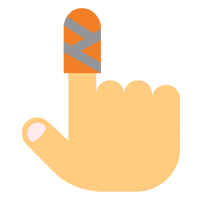
Losing a finger at work can have a profound impact on your life, affecting your ability to work and perform everyday tasks. In Australia, compensation for losing a finger at work is determined by factors such as the severity of the injury, the medical treatment required and how it affects your future earning capacity.
According to Safe Work Australia, finger amputations are the most common hand and wrist injuries. Sharp-edged equipment, machinery and vehicle accidents cause finger amputations, crushed fingers, finger tendon injuries and carpal tunnel injuries.
If you have suffered a finger injury at work, depending on how the injury occurred, you might be entitled to various compensation benefits. This guide explores typical payout amounts for finger injuries and provides essential information to help you navigate the claims process and understand your rights.

If you have had an accident and suffered a finger injury, you may be eligible to receive compensation benefits regardless of where you injured.
Compensation for Losing a Finger at Work - What Can I Claim?
The majority of fingertip amputation occurs during the course of work. If you are injured at work in NSW, you may be entitled to:
Reasonable and necessary medical expenses arising from your injuries.
Weekly benefit payments are calculated according to the pre-injury wages.
If your permanent impairment meets the 15% threshold.
If your physical permanent impairment meets the 11% permanent impairment threshold.
If your permanent impairment meets the 15% threshold and your employer was negligent.
Finger injuries can also occur due to motor vehicle accidents or someone else’s negligence at a public place. In these cases, your entitlements and legal procedure are different. Please access the pages below if you are:
Our experienced personal injury lawyers can help you understand whether your eligible and if so inform you of the best steps to go through a compensation claim for your finger injury to receive maximum compensation.

What is the Average Loss of Finger Payout in Australia?
If you have injured a finger at work, you may be able to claim expenses for medical and hospital care, income for loss of wages, and superannuation loss. Moreover, if the accident caused a permanent impairment, you may be eligible to claim a lump sum payment.
According to SIRA Workers Compensation Benefits Guide, if your permanent impairment reaches 11% Whole Person Impairment (WPI), the minimum payout for a loss of a finger is $28,840. A more severe injury involving the loss of multiple fingers or a thumb can result in a higher WPI assessment, with lump sum payments reaching up to $100,000 in some instances.
| Whole Person Impairment WPI (%) | Lump Sum Payment For Loss of Fingers |
|---|---|
| 11 – 15 | $28,840 – $43,920 |
| 16 – 20 | $47,690 – $62,770 |
| 21 – 25 | $66,540 – $81,620 |
| 26 – 30 | $85,390 – $100,470 |
Every claim including finger amputations are unique however, and it would not be accurate to specify an average payout amount without enough information. You can contact our personal injury lawyers to get a free claim assessment, and learn how much compensation you may get for your finger injury.
How to Make a Finger Injury Compensation Claim
To claim compensation for losing a finger at work, follow these steps:
Notify your employer about your finger injury as soon as possible. This ensures the incident is officially recorded and allows your employer to take the necessary steps to assist with your claim. Reporting the finger injury promptly also protects your legal rights under Australian workplace laws.
Visit your General Practitioner (GP) for a thorough medical examination. Request that your GP complete a Certificate of Capacity, which should detail:
- The nature and extent of your injury.
- Your doctor’s professional opinion on whether the injury was work-related.
This certificate is essential for lodging your workers’ compensation claim.
Complete a Work Injury Claim Form as soon as possible. Attach the Certificate of Capacity and any other relevant documents (e.g., medical receipts or evidence of the accident). Submit the completed form to your employer for processing.
⚠️ Important: You have up to 6 months from the date of the injury to submit the claim, but filing sooner can speed up the process.
If you did not submit the claim within this period, you may still have a right to claim compensation. Contact our team of workers compensation lawyers today for a free claim assessment.
Making a compensation claim for a finger injury can feel overwhelming, but our team of experienced workers compensation lawyers make the process simple. Contact us to start your claim today, all on a No Win No Fee basis.
Frequently asked questions
How long does a finger injury compensation claim take?
The length of time it takes to finalise a finger injury compensation claim is determined by multiple factors. Generally, work-related finger injury claims such as fingertip amputation, finger tendon injury, and crushed finger take about 1.5 years. Feel free to reach our team to get more precise advice for your claim.
What are the time limits for work-related fingertip amputation claim?
The time limit to submit the Work Injury Claim Form and Certificate of Capacity is 6 months in NSW. Also, the time limit to commence court proceedings is 3 years.
Who pays the compensation benefits?
If the injury occurred during the course of work, the insurance company of your employer pays the benefits of your workers compensation claim.
Do I need to pay to claim finger injury compensation?
The answer is no. Our team at Withstand Lawyers are approved by the Independent Review Office (IRO) which means you are not liable for your legal costs and disbursements as they are covered by IRO regardless of the outcome.

Reach our No Win No Fee personal injury lawyers
Our personal injury lawyers work on a No Win No Fee basis have helped thousands of workers in New South Wales to get what they are entitled to. We provide a no-obligation free claim check. You can reach us on 1800 952 898 or fill in the form below at any point during your finger injury compensation claim step.

Issa Rabaya
• Bachelor of Laws
• Graduate Diploma in Legal Practice
• Approved Legal Service Provider to the Independent Review Office
• Member of the Law Society

Issa Rabaya
• Bachelor of Laws
• Graduate Diploma in Legal Practice
• Approved Legal Service Provider to the Independent Review Office
• Member of the Law Society




